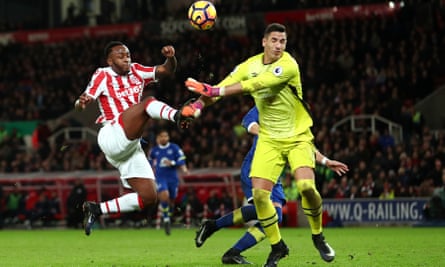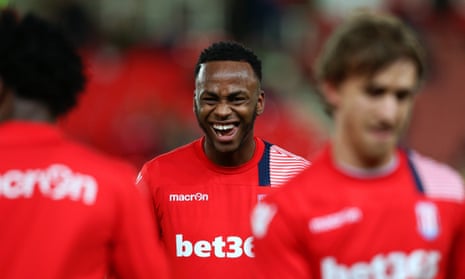It was one of those transfer deals that had all three parties feeling satisfied come the end. West Bromwich Albion picked up £12m for a player who could have gone for nothing in the summer, Stoke City signed a talented 23‑year‑old striker for a fraction of the fee that someone of his age and ability would normally command, and Saido Berahino welcomed the chance to be a professional footballer in active employment again.
For those involved there was a sense of relief as much as anything that one of the longest-running transfer sagas was over. Stoke finally had their man after more than 12 months of chasing, Albion could draw a line under an episode that had become tiresome and draining for everyone, and Berahino would be able to push all the negative thoughts about the club where he spent more than a decade to the back of his mind.
At least that was the theory. The reality is that in a strange twist of fate Berahino’s first away game for his new club is back at the Hawthorns, where Stoke take on West Brom on Saturday in a Midlands derby that will be dominated by the presence of a centre-forward who was named in the England squad a little more than two years ago but has not scored a goal for 341 days.
Berahino, who made his debut for Stoke as a substitute in the 1-1 draw against Everton on Wednesday night, registered his last goal on 27 February 2016. West Brom beat Crystal Palace 3-2 and the afternoon finished with Tony Pulis talking about Berahino, who had scored 20 goals in the previous season, in the same breath as Harry Kane.
Yet more often than not Pulis was left exasperated by Berahino, and that frustration and annoyance shone through in the West Brom manager’s closing remarks in the wake of the Stoke deal. Pulis talked about how it was time for Berahino to “get his act together” and “clear his head of all the nonsense that has gone swishing through it over the past six months and get back to being a professional football player, concentrating on getting himself fit and scoring goals”.
Stoke have vowed to give Berahino that platform and refuse to be discouraged by what has gone before. They know there is an element of risk, as with any transfer, but they did their homework on Berahino the person as well as Berahino the footballer. Jack Butland, who played alongside Berahino for England Under-21s and is highly respected at Stoke for his measured opinions as well as his outstanding goalkeeping, was one of many people the club consulted.
Although the initial outlay is £12m, Berahino has signed a five‑and‑a‑half‑year contract, taking the overall cost of the financial package to around £30m. At the same time, the board at Stoke know that Berahino will be seen as a bargain if he fulfils his promise. In Stoke’s eyes they have a potential 20-goal-a-season striker – with emphasis on the word “potential”.

There are people at Albion who would go along with that view and see Berahino’s unavoidable departure as a crying shame, given his obvious talent. Staff at the Hawthorns talk about Berahino’s touch, awareness and finishing as being “Champions League level”.
But it is not what Berahino does with the ball at his feet that tends to be the issue. The doubts generally surround how Berahino conducts himself off the field, including reservations about the influences outside of his family and whether some of the advice he has received along the way has been in other people’s best interests rather than his own. Several football agents have come and gone, and people have talked in the past about a “circus” around Berahino.
Handling fame and fortune is a challenge for any young footballer thrust into the limelight at the highest level and there is an argument that Berahino was likely to be more vulnerable than most to some of the pitfalls because of his backstory. He arrived in the UK in 2003, after escaping the civil war in Burundi, and lived in a care home for a few weeks before being reunited with his mother. Berahino’s father had died six years earlier during the war.
West Brom picked Berahino up at the age of 11 and worked on refining his raw talent. Mark Harrison, the club’s academy director, was a significant figure in Berahino’s life during the player’s schoolboy days, guiding him on the right path, and the two remain close.
Yet at first-team level, problems surfaced away from the pitch, where Berahino was guilty of not helping himself at times and, by his own admission, made some “stupid mistakes”. He was pictured inhaling nitrous oxide in 2014, banned from driving for 12 months after being found guilty of drink-driving in January 2015, and in February 2016 apologised to West Brom fans for threatening to go on strike at the start of that season after Jeremy Peace, the chairman, rejected Tottenham Hotspur’s £23m offer on deadline day.
That last episode was the turning point in a relationship that never recovered and did nothing for either party during the last 18 months. Peace effectively had ownership of the Berahino situation while he was at the club, with other Albion staff reluctant to get too heavily involved in what was seen as a bit of a mess. Berahino was not interested in signing a new contract and Peace had dug his heels in over his asking price.
By the time pre-season came around last summer, Berahino had it in his head that he was moving. Looking lean and sharp, he reported back to the club in decent physical condition – as good as the fitness and conditioning staff could remember – but everything unravelled again when a move to Stoke failed to come off and another window passed without a transfer. Berahino played 63 minutes at Bournemouth on 10 September and never kicked a ball for West Brom again.
Talking to a small group of journalists at Stoke last week, Berahino said that he never received an explanation from Pulis or anyone else at West Brom as to why he was frozen out and rejected allegations that his weight had been a major problem, claiming that he was only a few kilos over, despite suggestions to the contrary. Berahino’s suspicion is that he was demoted to training with the under‑18s and under‑23s and jettisoned from the first‑team picture because of his refusal to sign a new contract – something West Brom deny.
Whatever the rights and wrongs of the situation it was clear that something had to give in January, by which point Berahino’s position was seen as untenable at West Brom. He had only six months left on his contract, had not played a competitive game for four months, his value was depreciating all the time and West Brom were determined that Berahino’s name would not dominate another transfer window from start to finish.
On the morning the transfer was agreed, Berahino watched Mark Hughes give a press conference on television and “started panicking” when the Stoke manager said nothing was close. That was a true reflection of the situation at the time but things moved quickly that afternoon when both clubs softened their stance over the fee and agreed to meet somewhere in the middle. Berahino was with his mother when he got the call and said that he had never seen her so happy in his life.
As he told that story last week and rowed back over a deeply frustrating 18 months, Berahino came across well and gave the impression that he is in a good place mentally. He spoke with maturity, explained how dismayed he is to have picked up a reputation as a difficult character, acknowledged his mistakes and sounded desperate to make up for lost time. It is Berahino’s actions that need to do the talking now, though, both on and off the pitch.
